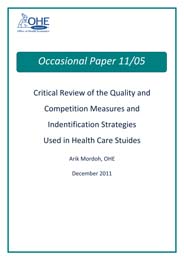Sign up to our newsletter Subscribe
Valuing Health at the End of Life: An Exploratory Preference Elicitation Study

Sign up to our newsletter Subscribe


The Office of Health Economics first drew attention to the fact that every country in Europe had some form of prepaid national health care scheme in a publication in 1963.
At that time it was commonly believed that Britain’s National Health Service was unique in removing the burden of payment from the patient at the time of treatment. It came as news to many people in the early 1960s that the NHS was only one of many different ways of accepting both the cost of health care and its provision as a community responsibility. It became clear from the OHE booklet that health care could be provided as a collective responsibility in a very large number of different ways.
Later, during the 1970s, it became fashionable in Britain to examine more closely the various health schemes in Europe, in order to see whether Britain’s Health Service could learn from experience abroad. This interest in European – and American – systems of providing health care has continued info the 1980’s, and there is therefore a role for a short up-to-date review of the European scene. The present OHE Briefing aims to provide such a review. It makes no attempt to evaluate the success or failure of the very different national approaches: it only describes them in brief outline.
Inevitably, in a short publication such as this, no attempt has been made to relate the different European schemes to the patterns of morbidity or the demographic characteristics of each country. Although the national correspondents were each asked to mention their problems and the public attitudes to their health services, their answers give only a glimpse of the true position in each country. However, as is discussed more fully later, it seems to be clear that no country has perfectly solved the difficult problem of providing optimum medical services at an acceptable cost.
An error has occurred, please try again later.
This website uses cookies so that we can provide you with the best user experience possible. Cookie information is stored in your browser and performs functions such as recognising you when you return to our website and helping our team to understand which sections of the website you find most interesting and useful.
Strictly Necessary Cookie should be enabled at all times so that we can save your preferences for cookie settings.
If you disable this cookie, we will not be able to save your preferences. This means that every time you visit this website you will need to enable or disable cookies again.
This website uses Google Analytics to collect anonymous information such as the number of visitors to the site, and the most popular pages.
Keeping this cookie enabled helps us to improve our website.
Please enable Strictly Necessary Cookies first so that we can save your preferences!